Joshua tree is a common name of Yucca brevifolia, a species of arborescent monocot native to North America.
Contents
Joshua Tree may also refer to:
Joshua tree is a common name of Yucca brevifolia, a species of arborescent monocot native to North America.
Joshua Tree may also refer to:

U2 are an Irish rock band from Dublin, formed in 1976. The group consists of Bono, the Edge, Adam Clayton, and Larry Mullen Jr.. Initially rooted in post-punk, U2's musical style has evolved throughout their career, yet has maintained an anthemic quality built on Bono's expressive vocals and the Edge's chiming, effects-based guitar sounds. Bono's lyrics, often embellished with spiritual imagery, focus on personal and sociopolitical themes. Popular for their live performances, the group have staged several elaborate tours over their career.
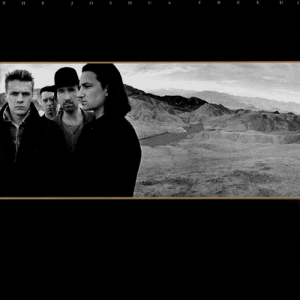
The Joshua Tree is the fifth studio album by Irish rock band U2. It was produced by Daniel Lanois and Brian Eno, and was released on 9 March 1987 on Island Records. In contrast to the ambient experimentation of their 1984 release, The Unforgettable Fire, the band aimed for a harder-hitting sound within the limitation of conventional song structures on The Joshua Tree. The album is influenced by American and Irish roots music, and through sociopolitically conscious lyrics embellished with spiritual imagery, it contrasts the group's antipathy for the "real America" with their fascination with the "mythical America".
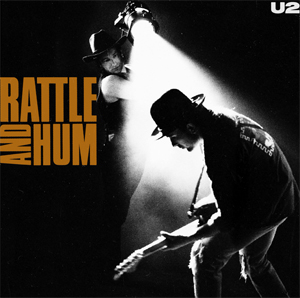
Rattle and Hum is a hybrid live/studio album by Irish rock band U2, and a companion rockumentary film directed by Phil Joanou. The album was produced by Jimmy Iovine and was released on 10 October 1988, while the film was distributed by Paramount Pictures and was released on 27 October 1988. Following the breakthrough success of the band's previous studio album, The Joshua Tree, the Rattle and Hum project captures their continued experiences with American roots music on the Joshua Tree Tour, further incorporating elements of blues rock, folk rock, and gospel music into their sound. A collection of new studio tracks, live performances, and cover songs, the project includes recordings at Sun Studio in Memphis and collaborations with Bob Dylan, B. B. King, and Harlem's New Voices of Freedom gospel choir.

The discography of the Irish rock band U2 consists of 15 studio albums, one live album, three compilation albums, 84 singles, and nine extended plays (EPs). The band formed at Mount Temple Comprehensive School in 1976 as teenagers. In 1979, the group issued their first release, the EP U2-3, which sold well in Ireland. The following year, the group signed to Island Records and released their debut album, Boy. It reached number 52 in the UK and number 63 in the US. They followed it up with the release of October (1981) and War (1983). War was a commercial success, becoming the band's first number-one album in the UK while reaching number 12 in the US. The album yielded the singles "Two Hearts Beat As One", "Sunday Bloody Sunday" and "New Year's Day", the latter two have since become among the band's most popular songs. On the subsequent War Tour, the group recorded the live album Under a Blood Red Sky and concert film U2 Live at Red Rocks, both of which sold well and helped establish them globally as a live act.

"Where the Streets Have No Name" is a song by Irish rock band U2. It is the opening track from their 1987 album The Joshua Tree and was released as the album's third single in August 1987. The song's hook is a repeating guitar arpeggio using a delay effect, played during the song's introduction and again at the end. Lead vocalist Bono wrote the lyrics in response to the notion that it is possible to identify a person's religion and income based on the street on which they lived, particularly in Belfast. During the band's difficulties recording the song, producer Brian Eno considered erasing the song's tapes to have them start from scratch.
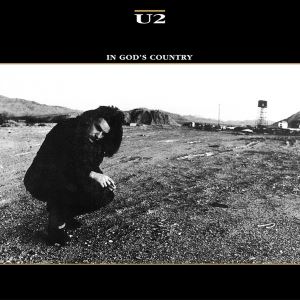
"In God's Country" is a song by the rock band U2. It is the seventh track from their fifth studio album The Joshua Tree and was released as the album's fourth single in November 1987 in North America only.

"I Will Follow" is a song by rock band U2. It is the opening track from their debut album, Boy, and it was released as the album's second single in October 1980. Lead singer Bono wrote the lyrics to "I Will Follow" in tribute to his mother, who died when he was 14 years old.

"With or Without You" is a song by Irish rock band U2. It is the third track on their fifth studio album, The Joshua Tree (1987), and was released as the album's lead single on 16 March 1987. The song was the group's most successful single at the time, becoming their first number-one hit in both the United States and Canada by topping the Billboard Hot 100 for three weeks and the RPM national singles chart for one week, with a further three weeks at number two.

"I Still Haven't Found What I'm Looking For" is a song by Irish rock band U2. It is the second track from their 1987 album The Joshua Tree and was released as the album's second single in May 1987. The song was a hit, becoming the band's second consecutive number-one single on the US Billboard Hot 100 while peaking at number six on the UK Singles Chart.
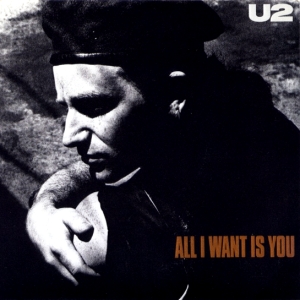
"All I Want Is You" is a song by Irish rock band U2. It is the final track on their 1988 album, Rattle and Hum, and was released as its fourth and final single on 12 June 1989. It also appears in the Rattle and Hum film, playing over the closing credits.

"Angel of Harlem" is a song by Irish rock band U2. It is the tenth track on their 1988 album Rattle and Hum, and was released as its second single in December 1988. It topped the charts in Canada and New Zealand, and peaked at number nine on the UK Singles Chart, number eight on the Dutch Top 40, number 14 on the Billboard Hot 100, and number one on the Mainstream Rock Tracks chart. Written as a homage to Billie Holiday, it was released with two different B-sides; one was an original U2 song called "A Room at the Heartbreak Hotel," while the other was a live version of Rattle and Hum's "Love Rescue Me".
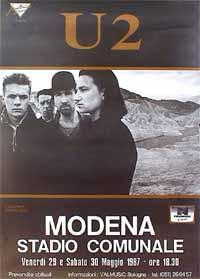
The Joshua Tree Tour was a concert tour by Irish rock band U2. Staged in support of their 1987 album The Joshua Tree, it comprised 109 shows over three legs, spanning from April to December that year. The first and third legs visited North America, while the second leg toured Europe. While it reflects previous tours in minimal production, the Joshua Tree Tour was the first to involve larger venues in arenas and stadiums as a result of the album's breakthrough. Like the themes of its parent album, the tour has the group exploring social and political concerns, along with American roots and mythology, collaborating with American guest musicians and opening acts such as B. B. King. U2 also recorded new material; these songs and the band's experiences on tour were depicted on the 1988 album and documentary film Rattle and Hum and on the 2007 video and live album Live from Paris. Territories that this tour missed would later be covered by Rattle and Hum's Lovetown Tour.
"Bullet the Blue Sky" is a song by Irish rock band U2, and is the fourth track from their 1987 album The Joshua Tree. Lyrically, the song was inspired by a trip that lead vocalist Bono made to Nicaragua and El Salvador, where he saw firsthand how local peasants were affected by United States military intervention in the region. Angered by what he witnessed, Bono asked guitarist the Edge to "put El Salvador through an amplifier." "Bullet the Blue Sky" is one of the band's most overtly political songs, with live performances often being heavily critical of political conflicts and violence.
"MLK" is a song by Irish rock band U2, and is the tenth and final track on their 1984 album, The Unforgettable Fire. An elegy to Martin Luther King Jr., it is a short, pensive piece with simple lyrics. It was because of this song and "Pride ", another tribute to King, that lead vocalist Bono received the highest honor of the King Center for Nonviolent Social Change, an organization founded by Coretta Scott King.
This is a timeline of the history of rock band U2:
"Mothers of the Disappeared" is a song by Irish rock band U2. It is the eleventh and final track on their 1987 album The Joshua Tree. The song was inspired by lead singer Bono's experiences in Nicaragua and El Salvador in July 1986, following U2's participation in the Conspiracy of Hope tour of benefit concerts for Amnesty International. He learned of the Madres de Plaza de Mayo, a group of women whose children had "forcibly disappeared" at the hands of the Argentine and Chilean dictatorships. While in Central America, he met members of COMADRES, a similar organization whose children had been abducted by the government in El Salvador. Bono sympathized with the Madres and COMADRES and wanted to pay tribute to their cause.
"Exit" is a song by rock band U2. It is the tenth track on their 1987 album The Joshua Tree. "Exit" was developed from a lengthy jam that was recorded in a single take and edited down to a shorter arrangement. The lyrics, which portray the mind of a serial killer, were inspired by lead singer Bono's reading of Norman Mailer's 1980 novel The Executioner's Song, and other related works.

"One Tree Hill" is a song by Irish rock band U2 and the ninth track on their 1987 album The Joshua Tree. In March 1988, it was released as the fourth single from the album in New Zealand and Australia, while "In God's Country" was released as the fourth single in North America. "One Tree Hill" charted at number one on the New Zealand Singles Chart and was the country's second-most-successful hit of 1988.

The Joshua Tree Tour 2017 and The Joshua Tree Tour 2019 were two worldwide concert tours by rock band U2 commemorating the 30th anniversary of their 1987 album The Joshua Tree. The 2017 tour visited stadiums over four legs: North America from May to July and in September, Europe from July to August, and Latin America in October. The 2019 tour visited Oceania and Asia in November and December, marking the band's first ever concerts in South Korea, Singapore, the Philippines, and India. The band played the whole Joshua Tree album during the concerts, which included their first live performances of the song "Red Hill Mining Town". It was the first time the group toured in promotion of an album from their back catalogue, rather than a new release. As part of the tour, U2 headlined the Bonnaroo Music Festival in Manchester, Tennessee, in June 2017.